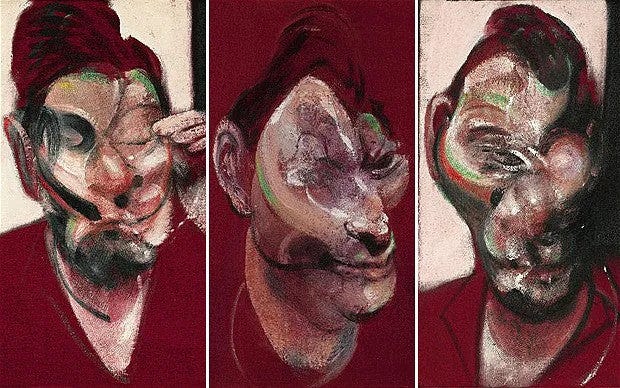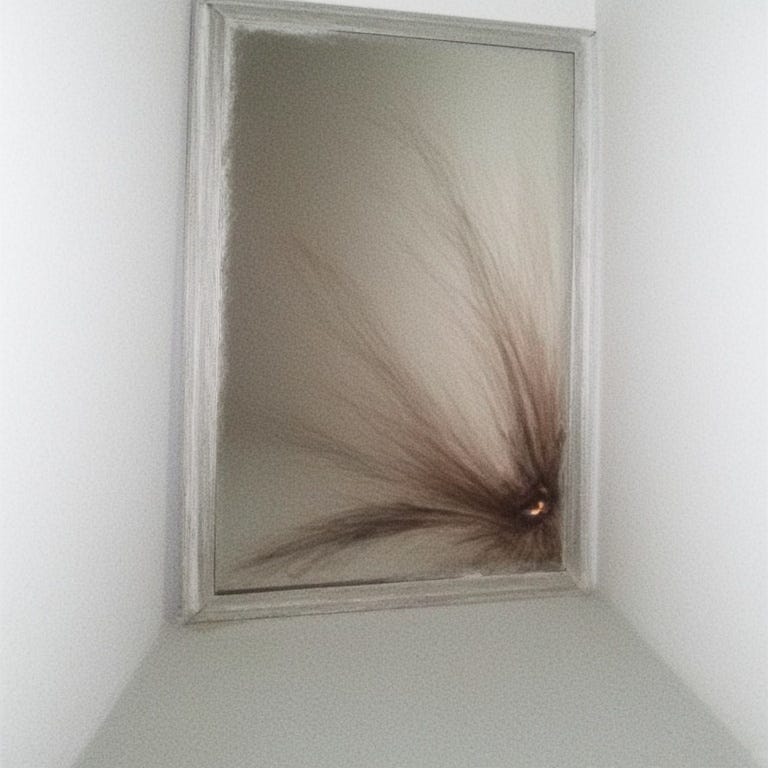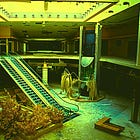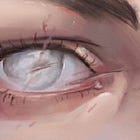Flickerbeast dwells in the mirror
in the corners, in the flickers
when gaze is turned elsewhere.
In peripheral glimpse of a jaw,
in glances-not-quite-there, a snarl-
half-real, half-dreamt, full-toothed.
That smirk, that springing-as-to-pounce.
Coffeehouse downtime, in the calm hours
it skitters in the glass. And is it me?
Redmond P. Paulson took off his reading glasses and placed the handwritten manuscript on his desk with a heavy sigh.
“Tell me, Kyrah, just what in the name of blistering fuck is this shit?”
“I don’t know, Red.” Kyrah Eastman crossed her legs and righted her stylish designer glasses. She looked him in the eye: “I haven’t read any of it.”
Her medium-length black pencil skirt and dark suit blazer were perfectly professional, and yet to Redmond Paulson they were also a fierce erotic provocation for which he despised and desired her in equal measure.
“Haven’t read it? Kyrah, you’re his literary agent.” Little flecks of spittle sprinkled across the page, and Paulson wiped them off with his hand. Smears spread from the poet’s inked scrawl, becoming part of the literary record. Paulson drew a breath and tried to contain his ire. He failed.”You’re the literary executor, for fuck’s sake! Our greatest living poet becomes our greatest unliving poet, and his own agent can’t be bothered to cast a glance over his final pages? What’s up with that, Kyrah? Please enlighten me.”
He fell back in his editorial chair, puffed out and pink-faced.
“It’s not that I wasn’t bothered, Red,” said Kyrah. “I hope you know by now I’m much more thorough than that. It’s just that I was warned not to read any of it. James’s widow Sally entreated me, with tears in her eyes, not to look at Flickerbeast Cantos. She’d intended to destroy it, but I got there first while she was busy with the police investigators, and I took control of the manuscript – per James’s will. I did my job. I’m doing it now, for all your bluster.”
Paulson made as if to pick up the smeared page he’d dropped on the desk, but then changed his mind and stared once more at the literary agent.
“Sally warned you not to read these poems... Warned you, Kyrah? What is this, some kind of Stephen King shit? Cursed pages, words of doom, all that crap?”
“That’s about the size of it.” Though she was smiling semi-ironically, wry and sassy as always in Paulson’s presence, there was also something deadly serious in her demeanor. As if, behind the easy self-confidence, she was actually scared.
She went on: “Red, Sally told me she’d dreamt that the pages themselves, these poems, carried the weight of the... vision, curse, whatever, that burdened James in his final days. She said she had the certainty – her word, ‘certainty’ – that whoever read these lines would also be subject to the same curse. Again, her word: ‘curse’.”
Earnest now, leaning forward in her seat: “She begged me to destroy the pages. I told her it was my job to preserve them. But I promised her I wouldn’t read the stuff. And my word of honor is my greatest professional asset. So... I didn’t read any of it.”
“And did you think to warn me of all this, Kyrah, before I started looking at this brazen drivel, this... this unpublishable mess?”
“I thought you’d only scoff at my warning and make disparaging remarks.”
“Damn straight I would, you dumb bitch! This is a house engaged in poetry publishing, the very highest level of literary endeavor, not some amateur fanzine for your pussy-chewing Sapphic fan fiction!”
Kyrah made to stand up and depart, body rigid with indignation. Paulson decided to let her go without attempting to make up. She’d performed her final task. Her usefulness was done.
“Make sure you leave all the pages, and don’t forget to pick up your check from my PA on your way out,” he said.
As she was stepping out the door, Paulson spoke again, but whether to Kyrah or to himself was not entirely clear.
“Come to think of it, it’d be a lot easier and a damn sight more profitable to publish fanfic dyke porn.” Slam. “Or maybe start a podcast about how to deal successfully with hallucinating poets, hysterical widows, and bluestocking lady literary agents with slutty dress sense.”
He seemed rather pleased with the witticism, and picked up his glasses in order to jot it down and maybe give it some polish, so he could share it later with his colleagues at the club as a spontaneous jeu d’esprit.
The problem with poets is they lie. They’re always using poetic license to fuss around with reality and make things that aren’t anything but wisps and fairy dust appear alongside the blunt everyday of trashcans and boxcars. Distasteful, really. Especially the urban ones. And the gay ones. Most especially the gay urban ones.
Or else they’re simply bananas. Loco, gaga, out to lunch. Redmond P. Paulson has lost count of the number of poets of his acquaintance that came to grief on the rocky shoals of their own mental instability. He’s recommended doctors for them, watched them stumble in from electroshock therapy, and in these later years from sessions with pill-pushers and feelgoods offering soft chemical balms for their mindfuck torments.
So many times he’s checked out the thorazine shuffle and the drying drool at the corner of the mouth, and thought to himself: That one’s played out, then. I’ll never get anything good out of a wreck like that ever again.
He picked up the scrawled manuscript and read on, hoping there might be something in James Jessup’s final work that could be salvaged for the publishing house:
Flickerbeast’s jaw strobes one moment
and chews an eternity up, chew chew –
flickerfangs pierce time’s jugular
and time’s lock is picked. The freeze
becomes now and tomorrow, seizure
and forfeiture of future oaths
involute in intimate instants.
Beast Me seized in a gaze grins
and snarls, and flickers gone again.
Chew chew? Like choo-choo-train?
Beast Me? Some kind of new comic-book villain, some cut-rate kiddie Mr Hyde?
Truly, Jessup’s last days were consumed by infantile regression and childhood nightmares in the most loathsome and vulgar mode imaginable. Even his Ivy League diction couldn’t save him in the end from crass sing-song doggerel and cheap confessional pastiche. Bloody tragic.
In his mind’s eye, Paulson saw James Jessup sitting across from him at his desk. The poet: bearded, unkempt, twitching with unexpressed metaphors and unreleased jism, scratching scabbed neck, squirms round awkward in his chair to face his editor.
“Where’s the soul in your soul?” says the memory-wraith. “Who did you rent it to?” Teeth glisten wetly with dark strands of mollusc trails.
The poet’s temporary specter stares right into Paulson’s eyes, and a now flicker of something is. Whiteout blackout. Judders in craze swirl of semiknown then gone. Sweatspine chill haildrops. Heartbeat unpulsing dread-drown in queasy sway. Breath again breathe again. Chest angst-hurt burning tight. No –
Leaning back in his red leather reclining swivel-chair, Paulson sucked in air again. He gasped in recall of the bleak momentary thing he’d seen in the nothing eyes of the dead man who’d never really been there.
Back at home, after a shower rinsed away his clammy fear, after putting Wagner on the turntable, after a stiff whisky or two, Redmon Paulson was feeling himself once more. He noticed but refused to notice that his eyes had skated around the bathroom mirror after showering. Now he thought about it, he’d avoided the mirror in the hallway when he hung up his raincoat. He immediately stopped thinking of it, and chose to savor instead the warm bite of the whiskey in his throat.
Home: Tristan und Isolde, Macallan Single Malt, the rich leathery smell of his living room and the soft weight of Pinnie his old golden labrador on his lap. Everything actually just fine, despite all the silliness in the office. Cursed words and scared broads. After all, he considered, stress and burnout such as he was experiencing are the unacknowledged professional perils of a high-pressure career in poetry publishing.
At dinner, Margo asked him about his day, in that way of hers she had. That going-through-the-motions way. He told her, in a jocular manner that he forced out of a tightened larynx, about the problem of James Jessup’s final poetic manuscripts, omitting all the nonsense about a curse and instead focussing on his agent’s stupidity and the problem of what to do with a set of poems that were essentially the ravings of a terminally sick mind. He tried out the line about the podcast and the bluestockings, but Margo didn’t crack a smile. Still needed some polishing before he could try it out in the club and wow the boys.
“So how did he die, Reddie? This Jessup fellow.”
“James Jessup? The greatest living poet of our generation? That fellow, Margo?”
“Not living any longer, Red. Yes, that fellow. Cause of death?”
“Suicided, Margie. Done himself in, as they say down on the farm.”
Roast beef, done just right; pink on the inside. Sofía the new housekeeper was turning out quite well, and he hoped they could keep this one at last. He carved himself another slice, and helped himself to the superb onion gravy.
Margo was still talking away when he phased back in on her drone: “...Jellibeth tells me that you’re not supposed to say ‘suicide’ or ‘kill oneself’ in college now. It’s ‘triggering’, apparently. You have to say ‘the great poet unalived himself’”.
“One thing I do know about Jessup is that, crazy or not, he would never have stood for language such as that.”
“You can’t say ‘crazy’ either, she told me. It’s ‘mentally ill’ or ‘around the spectrum’, or something like that.”
“All I know is that, mentally ill spectrum or not, Jessup would never have been able to bear the euphemistic nature of all this talk today, and had you subjected him to such jabber, it would’ve unalived him. All over again.”
Margo tittered just as much as her husband’s gag required, no more no less, and got right back to the point:
“I think you really could lean into the unfortunate James’s madness in selling his stuff, Reddie. Don’t worry too much about the literary quality of the stuff. Just promote the ‘mind pushed to the very boundaries of sanity comes back with unique insights worthy only of a prophet’ bit.”
“You think?”
“Worked with Plath. If anybody’s going to buy any poetry in this day and age, it has to be served with a spicy coating of lunacy, I’d say.”
This is exactly why Redmon Paulson earned the big poetry-publishing bucks. Because he had a wife who thought two steps ahead of the literary market. Paulson chewed on his beautifully tender beef and nodded his approval.
“And a side-serving of sanctimonious tragedy. Could actually work, Margie,” he said. “Great thinking. Bully for you, hun.”
He caught something in the corner of her eye but immediately looked away. A glint of something on the silver tray to reflect what not to be seen what not to see what to not see. Gaze rip quick sideway. Disrupt anyhow the sight. Heart tight, breathless ill stoppage. No
Flickershock vaults you in vast filth voids
and skidding to stop vertiginous
to gaze in eyes not eyes but hollows
locked in furnace of dreams not dreams
the wet smack burst beast, the thunder,
an ectoplasm of gouting heart's pale blood –
all in that snap of instant in the glass
photoflash dread sliced thin as whispers
the shatter the sliver the shiver the shard
the eye.
What utter gibberish this all is, thought Margo Paulson as she tidied up the kerning on the final draft. She’d come to loathe the work of the late James Jessup, all pity for him now long extinguished, and at last the copy was almost ready to pass on to the printer.
She’d had to step in, doubling up on her graphic design work at Splat! magazine, filling in on Redmond’s PoetryPress tasks during the evenings. The project of publishing James Jessup’s final poems had to go ahead by the end of this month, come hell or high water.
But Reddie wasn’t really up to it these past few days. He’d become progressively more anxious and burnt out. Something like man-flu, magnified to a barely-contained hysteria and then messily spilling out in childish blubberings of undefined grief and self-pitying narcissism. She’d come to abhor her disintegrating husband almost as much as the meaningless stanzas of the late poet Jessup.
“How did he die?” Margo’s daughter Jennifer was on the line again.
“He’s not dead yet, honey.”
“No, not daddy. The poet, this Jessup guy. How did he die?”
Margo went into the kitchen to rustle up a sandwich. Sofía’d taken the night off.
“It’s, uh, a personal matter, Jellibeth. The family prefer to...”
“So, he committed suicide?”
“I thought you young people prefer to say ‘unalived’, Jelli.”
“Whatever. How?”
“I don’t really know how, Jennifer, it’s not polite to ask these things.”
“You know I can just Google...”
“He swallowed broken razor blades and drowned in his own blood. Happy now?”
She found the bologna at the back of the fridge. On the line there was only a soft wisp of breath.
“Jellibeth? You there?”
“You shouldn’t have told me that.”
“You shouldn’t have pressed me.”
The line went silent. Jennifer was gone.
The mustard was hidden behind the ketchup in the top door compartment that was supposed to be for cheeses only. Margo would have to have a word with Sofía about fridge discipline. She closed the heavy door and something gleamed momentarily in its stainless steel sheen and was gone before her conscious mind could get hold of its skittering departure.
As she prepared her snack, Margo shook off the unsettling sense of being observed from dark corners in the kitchen that connected at unfamiliar angles. Walking back towards the library with her sandwich and a cut-glass goblet of Chablis, she heard a sharp whimper from the study where Redmond had been lurking these last few days. He lurked, crying and sweating, with a blue tartan blanket round his shoulders, headphones clamped to his ears full of Wagnerian arias, his shattered bloodshot eyes half-closed, humming softly to no known tune at all.
There – another brief animal whimper inside. She stopped outside the study door, placed her ear to the wood, and listened. Nothing. And then a low soft groaning. The tinny sound of Tannhäuser leaking out from headphones. Nothing again. Nothing...
Now a laugh rattled air like cracking bones. Behind her.
She yelped and dropped her plate, and her sandwich fell on the carpet in the hallway, coming open so the mayo and the mustard and the greasy red meat stained the deep white wool. Looking round behind her: nothing.
The hallway was empty and the hallway air chill and vacant, just as it had been before. But to her the corridor now seemed somehow hostile and expectant, though there was no reason to imagine why that should be so. There was quite literally nothing there.
She slammed the Chablis down her throat in a single swig and put the glass on a small table next to the study door. Leaning her left ear toward the door again, glancing over her shoulder as she listened.
The same bone dry laughter that she’d heard behind her before now came from inside the study. Was it Redmond? Was it him that laughed before, and somehow she imagined the sound in the hallway?
She knocked. “Reddie?” Nothing. Faint orchestral chords and wailing coming from his headphones. A smell that reached her from under the door of something like rust and earth mold. She held out her hand to the doorknob.
The flick of a sudden something reflected in the brass. A face like hers but formed of dripping wax and teeming rhizomal roots pushing through dirt.
Gone. She pulled her hand back and thought of looking again, and at the same time thought of not looking. Knocked again without looking at it, casting a glance behind at the cold absence and the hostility of the thing that wasn’t there.
And pushed, not knowing why she pushed. Pushed open the door.
An opera crescendo wailed small from out of the headphones on the couch. Blood in gouts and splashes. The iron smell and the earth.
There: in the corner, Redmond was crouched down facing the wall. Something soft and blond huddled beneath him. And she thought: the dog. Pinnie the old golden labrador.
He turned to gaze at her and he was chewing. Vitreous jelly dribbled on his chin. Crusts and gobbets of black thick clotting matter.
He grinned and his robe came open. Goop slopped out of his open mouth, the eyeteeth missing where rivulets of blood threaded his jaw. She saw whorls and threads of fine black fungal roots forming across his chest.
At his feet, as he stood up and turned to face her, lay Pinnie the labrador, right eyehole hollow-dark and gnawed about the rim. Redmond held out his hand to her and there was something in the palm. He offered it to her: the dog’s other eye to chew with him.
And she looked into the dark inside his own left eye that was more now than just a pupil, dark and again dark, become a vortex of the mirrored void inside them both. She saw it that face my face his face no face flicker sudden within that dark, burst no beast no best of all, and at her it smiled and welcome to your new bright world as she takes the glistening orb within her mouth and starts to chew chew chew.
======(( FLICKERBEAST CANTOS / END ))======
Submitted for the Lunar Awards Horror Contest with
as judge. Thanks to her and to for hosting and organizing.Thanks also to
, and for great critiques to help me along.MORE STUFF LIKE THIS?








Well, that was horrific. I admit, I skipped the verses. No need to tempt providence, is there?
Excellent excellent excellent